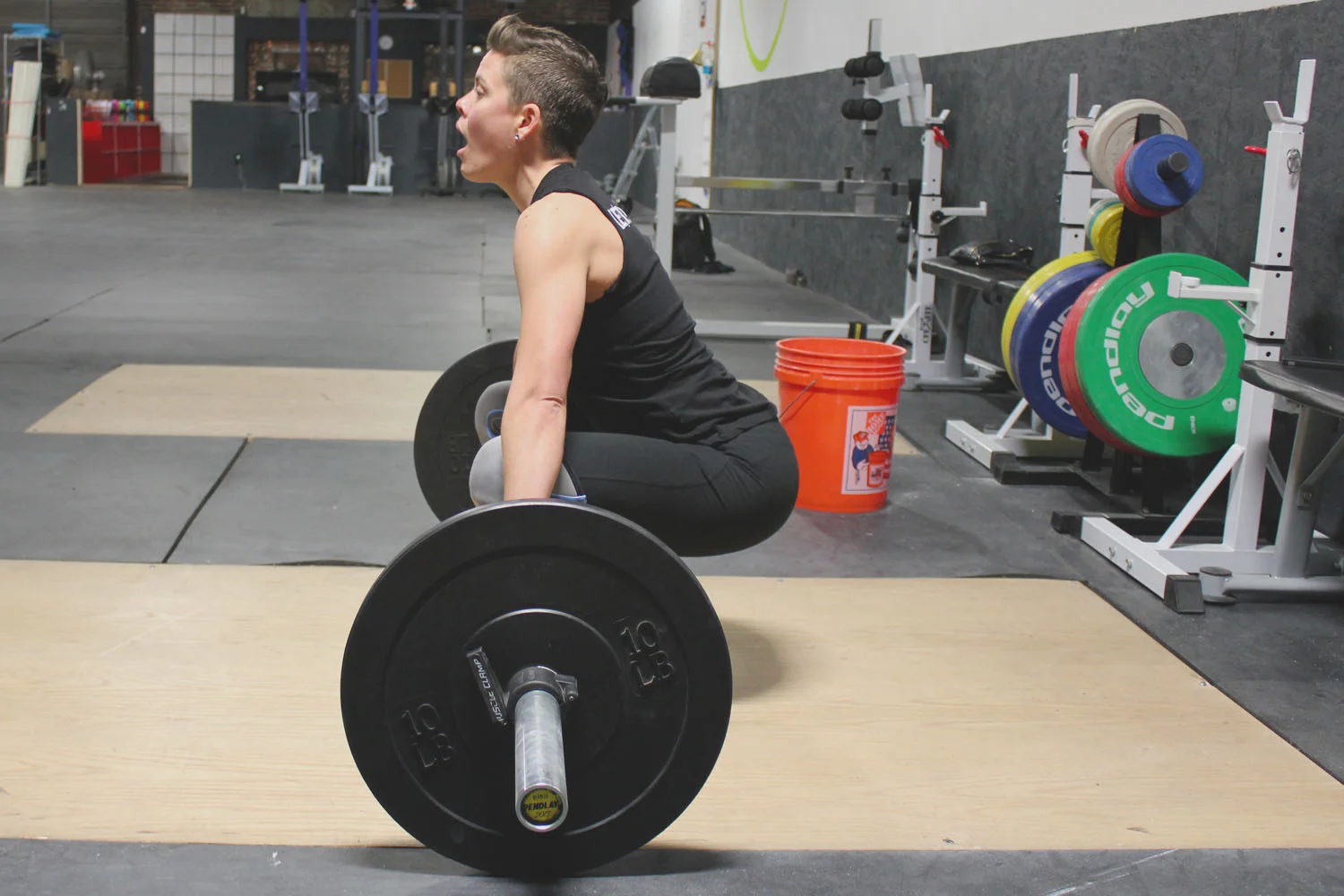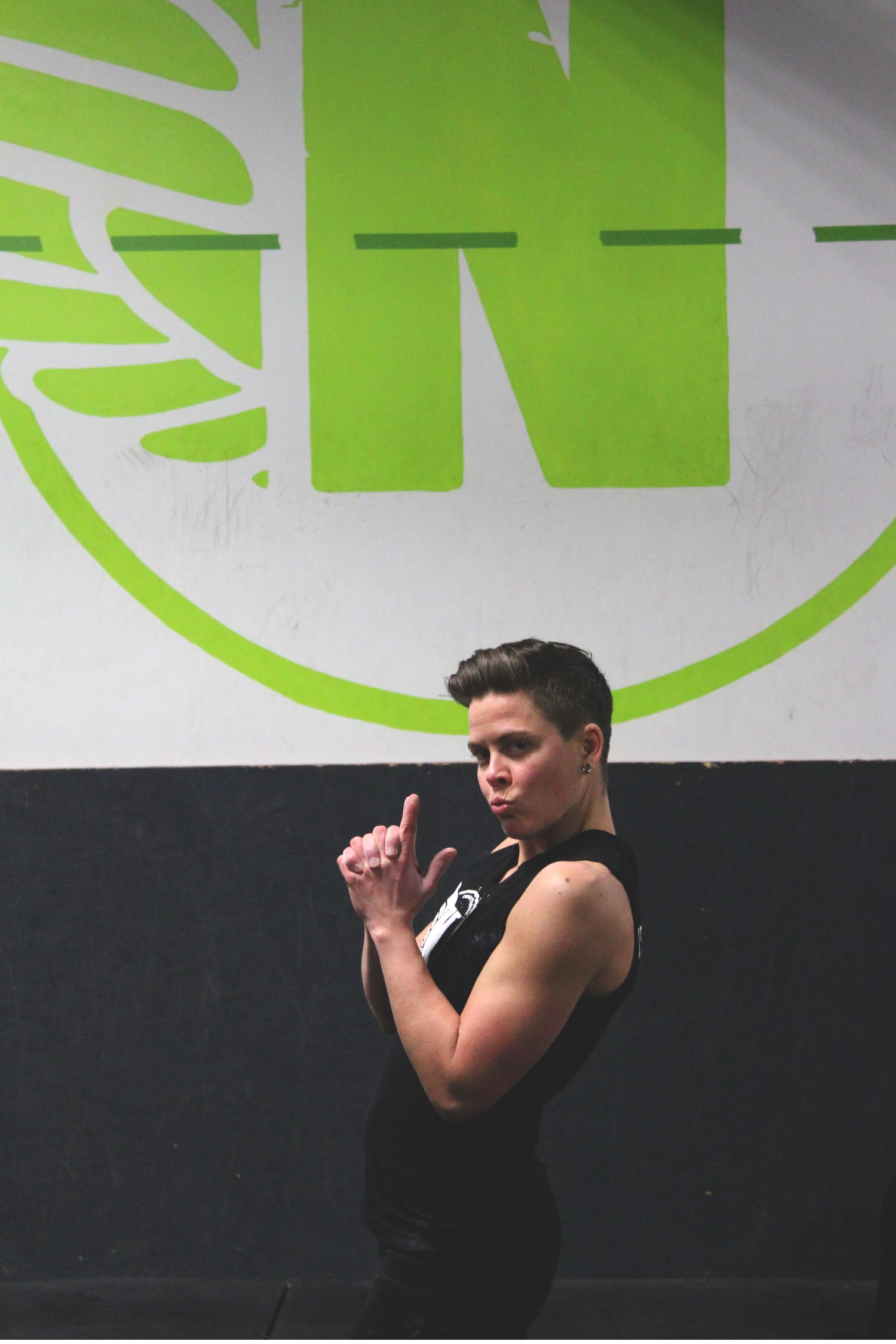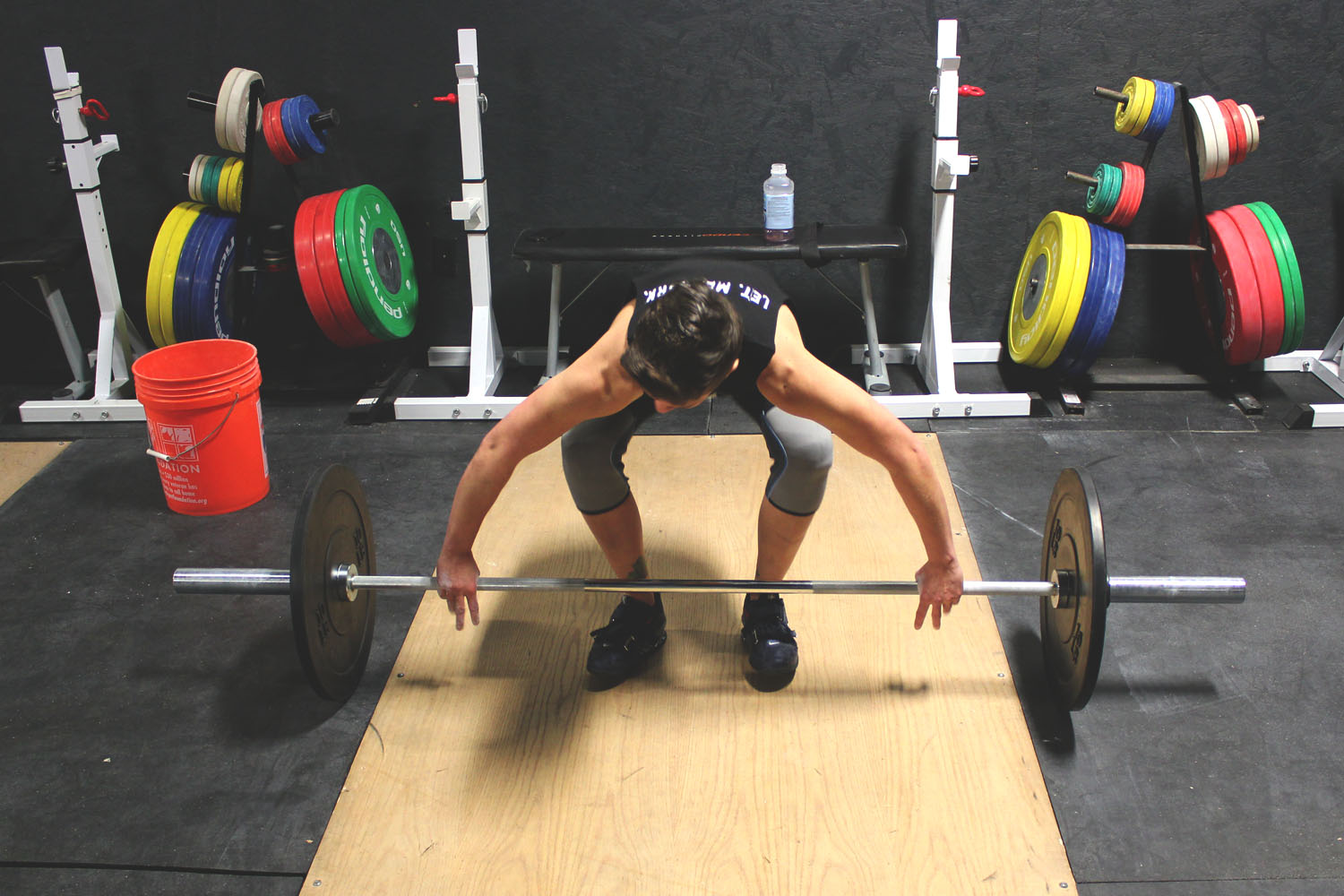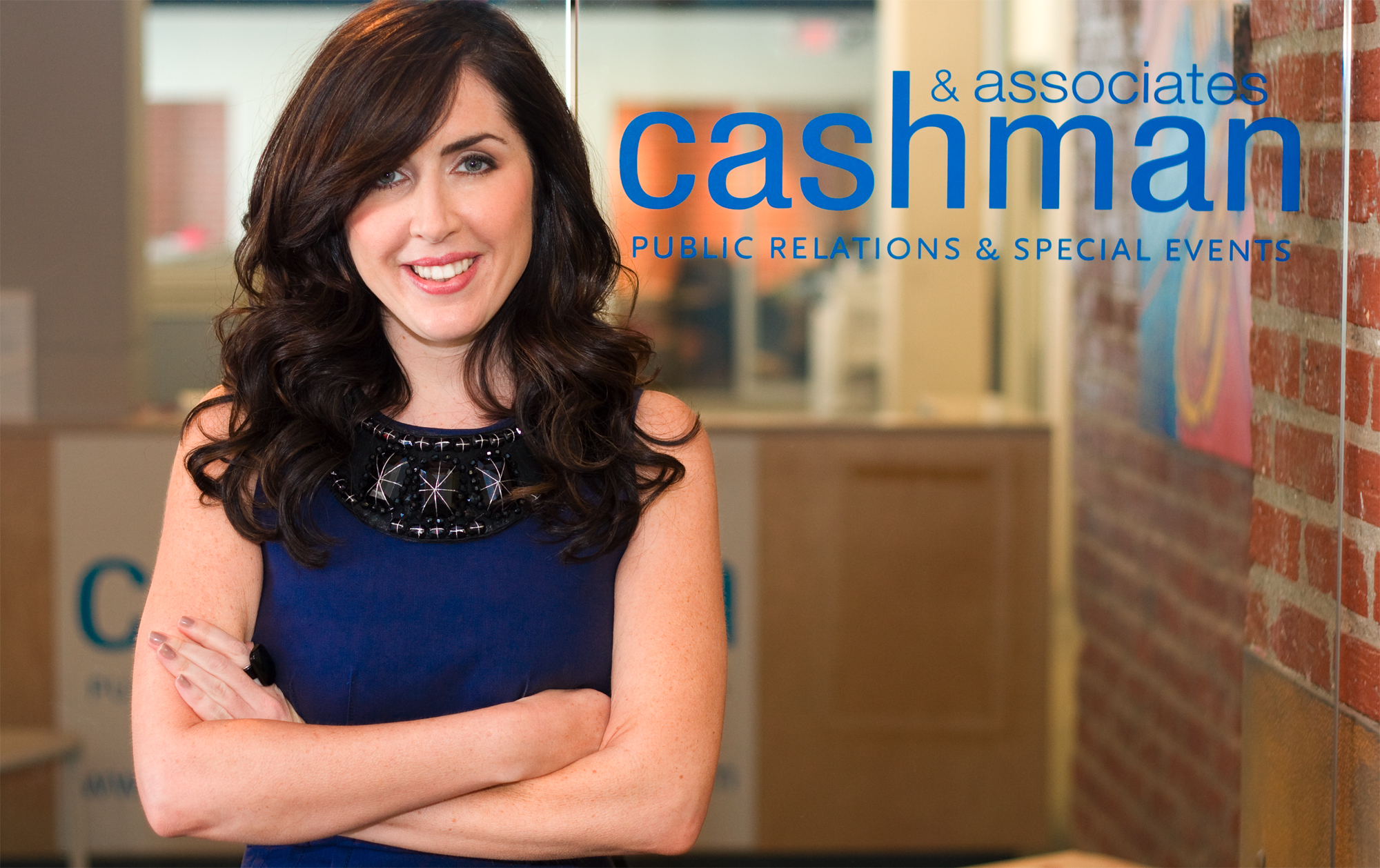Meet crossfit entrepreneur Lesha Meyer

Lesha Meyer is the co-owner CrossFit Novum, a Crossfit gym with two very popular locations in Fishtown. She is a community leader who teaches her followers about self-confidence and facing their fears. Meyer is remarkably strong, and not just physically. Find out about how she made it from Alexandria, Louisiana, became a graphic designer and a rugby player in the Philadelphia Women's Club, and found CrossFit at a time when her world looked bleak. You're known as the "Ragin' Cajun".
If I go home to Louisiana, they would tell me I am not Cajun! It's a joke. I was born in Texas and raised in Louisiana. I've got a little bit of twang in me. Camo is my favorite color.
What brought you to Philadelphia?
Art school, actually. That's my college background. I started out at a state university in Louisiana and then transferred three years into that program. I wanted to get into an accredited program for graphic design and get as far away from the south as possible.
You had a very active life in sports during high school: cross-country, competitive lifting...how did you get into that world?
I think it’s because my academics were so terrible. A lot of my friends had a pretty good idea what they were going to do with their future in terms of academia. I didn’t. I was good at sports, and I was good at art. I took to sports really well. I was always really active. That's how I stayed social, stayed out of trouble, gained my friendships. I did whatever felt the best.
Cross Country was my most intuitive sports. I had a lot of energy. I don't want to say meditate, but zone out and that was a great way to do that. It was me against myself.
I didn't get into power lifting until my senior year of school. I was raised by my grandparents. They said that I shouldn’t do power lifting. I secretly tried out and made the team. I had a district cross country meet following a couple of days. I was so sore. It could have been bad. They had me splayed out on the table, full body massage and icy hot to loosen up. I enjoyed it a lot. I took to it very quickly and very well. We took nationals for a decade straight, and we always swept every weight class. That was impressive and cool. Even though I was one or two in the weight class, it sounds good on paper (laughs).
Why didn't your grandparents want you to be involved in competitive lifting?
You’re talking about a good old southern woman and man raised in Ohio. They have a different approach to certain things, especially life and ladies. My grandmother always wanted me to be kind of a lady, and I took mostly to my grandfather. I'd rather do what he did than what she did. I didn’t want to cook and sew. I wanted to build stuff and work on the car, clean the car. She was always trying to push me or shift me into a more feminine role, which is (laughs) not really happening.
Eventually your grandparents found out, right?
They had to. I was like 'oh by the way I made the team and this is what’s happening'.
I ended up happening to get nationals that year and I competed in Chicago. Going from Louisiana to Chicago was a big deal. They gave in. They realized I was actually good at it. That's how they loosened their reigns. When they realized I was good as something, they kind of let me go.
It was so hard to get to Philadelphia. They didn’t want me to go. My academics in school weren't very good. I got a running scholarship that wasn't really worth anything, so running kind of fell to the wayside. I focused on art. They didn't think that I was good enough to make it. Not to say that they were bad parents. I loved advertising and they let up a little bit when they knew that I was succeeding in Philadelphia. I went from a 1.5 GPA in Louisiana and graduated with a 3.5. That worked out.
Was there a time when you thought you would pursue sports and lifting instead of going to pursue graphic design?
I think I always knew that sports were important to me. My relationships in the past were always with athletes. I was constantly around it. Earlier in my high school and junior high career it was how I fit in. I would run, work out, lift every now again. I tried my hand at crew. It didn't last very long. Part of what has shaped me is that I've always been told I'm too small. Being in crew, I was too small. They made me a cockson, which is the little person who commands and steers. Commanding I'm good at, but I liked the physical aspect of rowing. I still would have rowed, but I wouldn't have competed in a boat at my size.
There is the physical benefit of movement, but how did all of your athleticism translate to other part of your life?
It kept me out of trouble. It’s not partying, but it gave me something to wake up and go do! Crew didn’t last very long, but the running stuck with me for a long time. When I moved to Philadelphia I didn't do much in the way of sports. I went to Moore College of Art and Design. We had gym memberships and I would go over there and blow off steam. It was another outlet. I had a creative outlet, but there was a physical outlet I needed as well. There's that mind/body connection and being from a creative background, connecting physically is just as important to me.
When did you become interested in graphic design?
My grandpa's family friend was in advertising in Missouri and did large format billboards, but back in the day when they were hand painted. I was fascinated by that. Any event that I would do-- I used to go fishing with my grandpa all the time- I would make billboard advertisements for the lake that we were going to, or greeting cards for holidays, or neat architectural style drawings growing up. I always found that instead of drawing, you needed type or words. I'm fascinated by typography; I have a little bit of dyslexia which is why sports were better for me. Looking at works, I see shapes and texture versus actual words. There's always a spot for it.
Did you do any internships or apprenticeships at Moore?
By your junior year you had to seek out internships. They groomed you to use the city as a campus. We would go out everywhere, collecting flyers and postcards and going to museums. They forced us to get out there in the world. An internship was required for graduation. Philadelphia is so small, and the advertising world is pretty incestuous. That company has now been spun out 4 or 5 different ways since I had been there. I won a fellowship for typography and went to study at a college in Maine for a week. I knew that [graphic design] was what I wanted to do after school.
I got a job immediately after school. I graduated in 2003, finally, and a lot of people couldn't find careers. The market was down. I was there for 9 years. I've taken roots in Philly. I moved here in 1999 and now I own a business here in Philly that has nothing to do with graphic design. It's fostering part of my passions, which would be the fitness. Having the background in graphic design has helped tremendously on a lot of levels.
How did you find your way back to fitness full time?
After I graduated from college in 2003, I met someone who played rugby for Philadelphia Women's club. She was like 'why don't you come and play?' I've been told I'm always too small to play rugby. So why not!
I started playing rugby and loved it, absolutely loved it. Running, tackling, learning how to use my body in a different way. It was a great outlet. It fostered that social aspect as well. I made a ton of new friends, got to travel. I played for about 6 and a half years. With hanging out and eating poorly and going to drink ups after playing rugby, I realized that I was actually out of shape.
Two years before my retirement from rugby I became friends with a woman named Jen Sinkler. She's huge in fitness editorial via web. She exposed me to a form of CrossFit at this place called Urban Athlete in Mount Airy. We were going out there for a summer and I was like ' this is great. Now I'm fostering my sport by actually training to be better at my sport outside of my sport'. Instead of practicing tackling and running, I'm doing dumbbells and kettle bells, pull ups, lunging, and sprinting.
It felt really good, but then I got crushed. I got tackled pretty badly, fractured my rib, and collapsed a lung. Cracked ribs are not unusual [in rugby], but a collapsed lung is serious impact stuff. I got hit by a very large woman. I was out for the season and then got a little bit depressed. I couldn't work out; I gained weight for my size, which was not healthy. This was May 2009. I was displeased with myself. I didn’t like the way I look, I didn't like the way I looked naked, I didn’t feel well. I played rugby, but I wasn't doing anything to make myself better at rugby. I was going to retire in the fall.
I found CrossFit. I found a gym in South Philly where I was living and started up and was absolutely hooked. I was going to CrossFit before rugby practice, which was horrible because I was so tired. I loved it so much. I was going five, six, seven days a week. No rest. I just loved it. Getting to manhandle a barbell...there's something pretty spiritual about it. I was talking to my assistant barbell coach about it today. He said it’s like kung fu. You come up to the bar and it’s you versus the bar. The bar's not going to lie to you. There's a great article out there by Henry Rollins. You're going to tell it what to you, or it's going to tell you what to do. It's all about control. I just took to it really well and ended up retiring from rugby in November 2009. Because I was so addicted and inspired by what I was doing with CrossFit, it became infectious. I was asked to become a trainer. I've been training ever since.
It seems like CrossFit really pulled you out of depression.
It helped me dig a little deeper. The only person that can ever hold you back is you. Some workouts were terrible. It goes back to cross-country, it's just me. I'm picking up my feet right now. No one can pick up my feet but me; no one can pick up that barbell but me. That kept me going. The physical results and some of the vanity, that just comes with the territory.
What about CrossFit do you think so many people find inspiring?
Having been inspired and watching people get inspired it's watching your self-confidence grow. Take the dead lift. When done correctly and heavy, you watch people's negativity just explode out of the top of their head. The way they breathe and approach and expel that breath. They put it down and they look lighter, like they just accomplished something fantastic. They can take that moment and translate it to anything else in their life. A 300 lb barbell on the floor can be an equivalent to a bad marriage, or a bad boss or a bully. You step up to it, take it for what it is, deal with it, put it down, and walk away. They walk more upright. They're smiling. Endorphins equal happiness.
For much of your adolescence you were told that you were too small. Has cross fit changed the way you perceive your size?
There are a couple sides to CrossFit. The old school CrossFit way is you pick it up, and put it down whether you're 135 lbs or 230 lbs. The same weight. This is why I have started to translate more to the Olympic style lifts. There are weight classes now. Being put in a proper weight class with somebody closer to your size has been helpful. At the end of the day, there are no excuses. It’s 95 lbs, it’s 95lbs. I'm going to pick it up over my head as many times as I can, just like somebody twice my size.
Was it difficult to go from your design gig to a career in CrossFit?
It was terrifying. Fear is what drives us. I refuse to fail at anything. I thought about it, I dreamt about it, I studied it. Having the visual arts background has helped me a lot, watching people move through space. I liked it more, I liked it so much more than what I was doing. CrossFit is for everybody, but how can you make it adaptable to anyone? I had to get creative in those aspects.
I was getting completely fulfilled in a lot of ways, creatively as a teacher, spiritually. One day I was hanging out around super bowl weekend. I was hanging out with my current business partner, Joe. He was like, 'hey, want to open a gym'? Ok, let's do it!
We spent about 6 months talking, figuring out stuff. We did a lot of mental legwork. Figuring out how much money we would need, starting to look at real estate. Talking to other gyms and affiliate owners, picking their brains. It was a natural progression. I couldn’t do what my current gym was doing because it wasn't my gym. I wanted my own experience with that. I worked full time at my other job. I ended up becoming the art director. I worked my morning classes, went to work full time, and came back in the evenings for the on ramp program. It was very rough.
Because we were able to sustain, we were able to go full time. We did that in May of 2012. I slept for a month (laughs)! After we caught up on sleep, we opened up our classes more. Now here we are, second location in two and a half years.
Did you have any self-doubt when you were planning the first location?
There's always going to be some doubt. Fear makes us stronger. We had gone through a lot of trial and error, we were able to rectify the wrong and move forward with the right. We love it so much. I think it really reflects in our business and how we keep things moving. The community has stuck around. A lot of people get bored with gym routines but a lot of people stick around. They're here 4 or 5 days a week, sometimes more. We tell them to go home and rest! It's amazing. I consider us farmers of some sort. We're cultivating, growing people. They end up growing on their own. It's cool to watch the community move and grow and shift. It's pretty strong. There's fulfillment in that itself.
Would you consider yourself a feminist?
I don't. I do believe in women's rights. I believe in men's rights, and everybody else's rights. There are points where it is a man's world. At times I'll say to Joe, 'watch this guy, he's not going to talk to me. He'll talk to you.' Joe never noticed it, but why would he see it? He's a man. Joe will say 'it's so crazy.
I think sometimes women have to sit up straight and be a little aggressive, which can equal a bad rap. You get considered “bitchy” when you're trying to be assertive. There is an art to finessing feminism.
Is it unusual to be female trainer and own a gym in the CrossFit world?
Yeah. There are a few of us in the Philadelphia area. They are fantastic women, Women are intimidated by lifting weights. They don't want to get too bulky, whatever that means. It's been a male dominated field, and I think that there's a place for women. There's a great place for women.
The media is always pushing women to be skinnier and skinnier, while CrossFit builds strength. How do you think CrossFit is helping to change the way that women see themselves?
It's a more natural body shape for women. There's so much stuff out there. Dove did a really good campaign at one point with how women get made up. There have been several incidents with photo shop and how women are adjusted. It's unfortunate. Women in their most natural state— strong and healthy— are hot and sexy. It means they can hold their own.
I've heard shitty comments like 'her balls must be as big as mine'. She can probably kick your ass right now! I think strong is beautiful. I think strong is beautiful. I hope the movement keeps going. Especially the women in our gym, we're fortunate we have a community that is probably about 50/50. It's usually not the case. Some CrossFit gyms end up having a woman's only hour just because women don’t like all the testosterone. There's definitely a different vibe when you have a bunch of guys in the class versus a bunch of women. I think it's just the nature of us as beasts.
You know what it took to get there!
Yes. Men have a tendency to talk about wanting their 'man time'. You get an athletic woman, and they 'just want their athletic time'. There's a lot of independence, and independence can be attractive.
What would you say to a woman who is looking to get into CrossFit or improve their level of fitness and get involved in the community?
Just show up. Honestly, just show up. You put in the work. All of our clients, male and female ask how long it’s going to take. When will they see results?
Well, when are you going to get here? When are you going to show up? When are you going to work hard? Everything else will fall into place.
Do you have a motto that you use a lot?
I say a lot of things (laughs). I have a lot of mottos! My personal motto is 'Dynamite comes in small packages'. I've always stuck to that.










